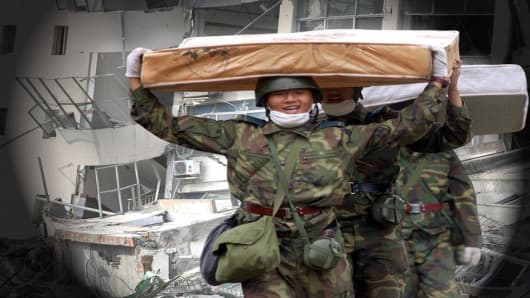Tents and awnings are in demand for more than 110,000 military and civilian rescuers. Officials said China needed up to 3 million tents to house an estimated 5 million people left homeless by May 12's 7.9-magnitude quake.
"We're really short of tents. So we hope that other provinces that want to help us and other countries can donate them," vice provincial governor Li Chengyun told reporters on Tuesday.
The disaster-hit areas, mainly in Sichuan, had received 280,000 tents and factories were working around the clock to deliver another 700,000, Jiang said.
Many residents of Chengdu, the provincial capital hit by a persistent drizzle on Wednesday, spent the night in tents, fearful of building collapses.
Nearly the whole population of Shifang, a small city near Chengdu, slept outside on Tuesday night despite the rain. In the countryside, many farmers now live in encampments of makeshift shelters with their homes too damaged or too unsafe to live in.
"Everyone's living outside now, even with the rain," said farmer Wu Xingyao under the cover of plastic and tarpaulin.
"We don't know when it will be safe to go back inside our houses but I don't know how long we can put up with living outside either."
China raised the number of dead or missing from the earthquake to more than 70,000 on Tuesday, as rescuers found more survivors eight days after the huge tremor hit.
Xinhua reported a 60-year-old woman was rescued in Pengzhou, more than 196 hours after the May 12 quake struck. It said she had survived on rainwater.
White Flowers
A government statement said the number killed now exceeded 40,000 and Xinhua news agency said a further 32,000 were missing.
Authorities had previously said they expected the final death toll to exceed 50,000. More than 247,000 were injured.
With heavy rain forecast for the next two days, Premier Wen Jiabao urged the Water Resources Ministry to send experts into quake-hit areas for 24-hour patrols of dams and reservoirs that could break their banks and cause flooding.
China has also ordered that all donations be made through the Red Cross Society of China in an apparent bid to avoid duplication and bogus charity appeals.
Mourners placed white funeral flowers in the main square of Chengdu on Tuesday and burnt paper offerings. Traditional Chinese flower arrangements leaned against a flagpole in Tianfu Square, where the flag was at half-mast for three days of national mourning.
Hundreds of bouquets of yellow or white flowers were piled around the flagpole and citizens had covered bushes on the square with white paper flowers, tied on with black gauze. White is the traditional colour of mourning in China.
Thousands of people later gathered on the square after dark, chanting "Go Sichuan! Go China!" provincial television reported. It ran footage of masses of people chanting and crying.
Emotions are particularly raw in Chengdu, which is only an hour's drive from the rubble, death and tent cities of the disaster zone.


